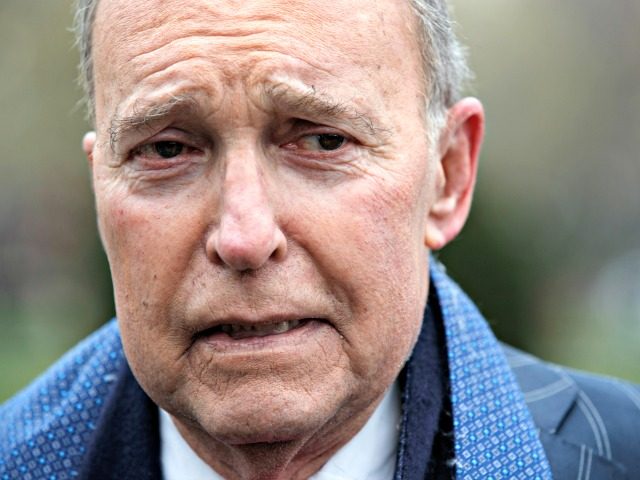National Economic Advisor Larry Kudlow revealed Friday afternoon that the Trump administration is mulling over creating and providing China a list of suggestions that the United States would like to see come out of negotiations over trade practices and tariffs with the country.
In the limited Roosevelt Room briefing with Kudlow, reporters asked about comments from Treasury Secretary Steve Mnuchin that have been interpreted by some to mean that tariffs on China are not intended to, but could cause a trade war. Kudlow replied that “any foreign policy can go awry” and that is probably what Mnuchin meant. “We’re not in a trade war.”
Late Thursday, President Donald Trump revealed consideration of $100 billion in tariffs on imports from China. China responded in retaliation, threatening $50 billion in tariffs on American exports to China.
“What this is is an attempt by a strong-willed, strong-backboned President to right some very bad wrongs in the trade area, with respect to China,” Kudlow clarified.
“China is the problem, blame China, not Trump,” he offered as a response. “China’s been practicing unfair and illegal trading practices for several decades and they’re out of compliance with the World Trade Organization in many cases.”
The economic advisor identified the “key” as “technology and the fact that the Chinese routinely steal our technology.” He pointed to decades of Chinese trade violations, a sentiment repeated by Press Secretary Sarah Sanders moments later during the regular White House press briefing.
The newly minted National Economic Advisor emphasized that the real problem is China stealing U.S. technology, when technology is the future of the American economy. “We can’t let them steal our work in this area, which they routinely do.” He described how “China has faced technology transfers” for American, British, any country’s companies who want to set up in China. This involves a company completely opening up its technology blueprint. He brought up that China routinely steals U.S. intellectual property, the dollar value of which is hard to estimate.
“The American economy is driven by technology and technological advances,” said Kudlow, “that is the future for us. That’s our entrepreneurial future, that’s our innovation future, that’s what’s happened in the last 40 years basically.”
“We can’t let them steal our work in this area, which they routinely do,” said Kudlow.
“I’m not a tariff guy, I don’t like to use tariffs,” he said before admitting that sometimes tariffs have to be used. He said he’s hoping this process “does not include tariffs, but it may.”
The goal of the administration’s process in this situation involves getting China to open up and stop bad practices. He said it “requires a certain amount of discussion, at home and with China.”
Perhaps one of the more poignant comments from the economic advisor was a clarification that President Trump’s Thursday announcement regarding up to $100 billion in tariffs on China was not installation of those tariffs, but instruction to the U.S. Trade Representative to “consider” whether such additional tariffs “would be appropriate under section 301, to consider.”
He emphasized that there is still a decision process involved, that the tariffs aren’t going into effect today, but rather this process involves further announcements, several months for public discussion, evaluation from U.S. Trade Representative Robert Lighthizer and President Trump of that discussion, and then a decision. This process could take at least a couple of months.
Kudlow followed this by saying, “Hopefully there will be more satisfactory conversation and dialogue with the Chinese.”
He told reporters that he had spoken with Lighthizer just last night.
President Trump, Kudlow, and Mnuchin all view the Chinese response to the United States’ first part of the process as “highly unsatisfactory,” according to the economic advisor.
Kudlow said that during Thursday discussions with the President he was told to convey that Trump’s relationship with Chinese President Xi Jinping is “still very good.” He added that he had not heard anything to the contrary.
Tariffs may not be necessary as the process plays out, but Kudlow said he hasn’t taken them off the board. “If China remains in violation of various WTO laws or international standards on technology and free trade,” Kudlow said he believes Trump would use tariffs, “absolutely.”
China “cannot continue to break the laws of trade as they have for over 20 years,” said Kudlow. “They have no supporters.” He presented the situation as a new first world economy, China, integrating itself into the world.
“The United States may … provide a list of suggestions to China as to what we would like to have come out of this,” said Kudlow, who added that this is under discussion.
Follow Michelle Moons on Twitter @MichelleDiana

COMMENTS
Please let us know if you're having issues with commenting.